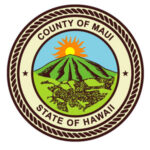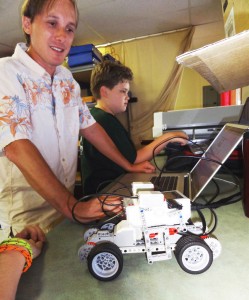
Jun 11, 2014 | Education
 A Ke Alahele Education Fund grant for Montessori School of Maui was intended to support its engineering and robotics programs plus help provide a practical learning environment for students to enhance their skills in science, technology, engineering and math or STEM. But it went beyond that, according to Thomas Daubert, the school’s director of development. “In its first year, our after-school Robotics and Engineering studios have provided a fun learning environment for up to 16 students each session,” he said. “The students came away with increased skill development and a new way to perceive themselves and the physical world around them,” Daubert said.
A Ke Alahele Education Fund grant for Montessori School of Maui was intended to support its engineering and robotics programs plus help provide a practical learning environment for students to enhance their skills in science, technology, engineering and math or STEM. But it went beyond that, according to Thomas Daubert, the school’s director of development. “In its first year, our after-school Robotics and Engineering studios have provided a fun learning environment for up to 16 students each session,” he said. “The students came away with increased skill development and a new way to perceive themselves and the physical world around them,” Daubert said.
At Montessori, students work in teams to learn the mechanics of simple machines, basic electronic circuits, polarity, magnetism and more. Jason Verkaart, the Robotics studio coordinator, is also a parent of a student at the school. Each session culminates in a fun competitive race or game using the vehicles and systems constructed throughout a course. “Our students have become very excited about seeing the physical application of math, engineering and science coursework and have personally experienced the enthusiasm of a parent working within his profession,” Daubert said.
Daubert said the program was a good fit for a Montessori school with its strong emphasis on hands-on, experiential learning. “As a Montessori school, on a daily basis, we work to develop the interests of each unique student through practical collaborative work, which is the basis for a successful Robotics program. This is a great fit for our school, and we look forward to finding even greater connective points between this after-school studio and our core curriculum activities in the coming year.” MEDB established the Ke Alahele Education Fund to power up STEM Education in Maui County. This year’s Ke Alahele Education Fund Dinner and Auction will be held Aug. 23 at the Grand Wailea Resort. Call 875-2300, or www.medb.org
May 14, 2014 | Education
 Kualapu’u School teacher Susan Forbes began her Ke Alahele Education Fund grant project with a goal – field a competitive robotics team. It was a building year at the Molokai K-6 charter school and this year the students were not ready to compete. The hope is that soon the returning students will have enough foundational knowledge to handle the robotics materials and that program hours can be expanded to give students enough time to complete their projects, Forbes said.
Kualapu’u School teacher Susan Forbes began her Ke Alahele Education Fund grant project with a goal – field a competitive robotics team. It was a building year at the Molokai K-6 charter school and this year the students were not ready to compete. The hope is that soon the returning students will have enough foundational knowledge to handle the robotics materials and that program hours can be expanded to give students enough time to complete their projects, Forbes said.
While she was unable to immediately field a competitive robotics team, Forbes was able to adapt how she trains the students. “I no longer ‘train’ the students individually,” she said. “Instead, I train one student at a time, with the expectation that the student will go on to train another student and so on. This works well and results in students becoming better listeners and observers during the initial teaching,” Forbes explained. All the team members, except two, were exposed to robotics for the first time this school year, Forbes said. “At the end of the year, all participating students learned how to build, program and operate a robot. In addition, the problem-solving format of the challenges promoted perseverance, higher-order thinking, and teamwork – since difficult problems are best tasked out to groups. The students also learned “how to work with one another and to develop their own values and character,” Forbes said.
STEM education incorporates knowledge of science, math and technology with creativity in design and engineering, she said. And, by incorporating the components into one, “student engagement and learning are enhanced.” Forbes said schools should support education in science, technology, engineering and math “not only so that their students see the connection between problems, ideas and solutions/products, but also that their students are better prepared for the types of careers that await them.” MEDB established the Ke Alahele Education Fund to power up STEM Education in Maui County. This year’s Ke Alahele Education Fund Dinner and Auction will be held August 23 at the Grand Wailea Resort. Call 875-2300, or go to www.medb.org.
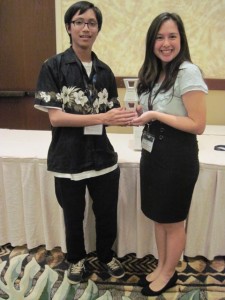
May 7, 2014 | Education, Innovation
 King Kekaulike High School students used their developing skills in science, technology, engineering and math (STEM) to help special needs students overcome a lack of fine-motor skills to create works of art. The project was one of the highlights at the Hawaii STEM Conference held May 2-3 at the Wailea Marriott Resort. “I really enjoy science. I really enjoy art, and STEM shows you that you can bring science and art together,” said sophomore Maya Ooki. She and her classmates Jeremie Amano and junior Rosie Kulhavy-Sutherland made up King Kekaulike’s Program Impact Assessment (PIA) Team. The team was tapped as the overall winner of the PIA competition at the conference.
King Kekaulike High School students used their developing skills in science, technology, engineering and math (STEM) to help special needs students overcome a lack of fine-motor skills to create works of art. The project was one of the highlights at the Hawaii STEM Conference held May 2-3 at the Wailea Marriott Resort. “I really enjoy science. I really enjoy art, and STEM shows you that you can bring science and art together,” said sophomore Maya Ooki. She and her classmates Jeremie Amano and junior Rosie Kulhavy-Sutherland made up King Kekaulike’s Program Impact Assessment (PIA) Team. The team was tapped as the overall winner of the PIA competition at the conference.
Using 3D Computer Aided Design (CAD), senior A.J. Ramelb created a paintbrush using Solidworks – a 3D CAD program. The 3D CAD design was then printed with their 3D printer allowing Kekaulike’s students with special needs to grip a paintbrush well enough to paint. “It was a really cool project because we used STEM to benefit our community,” Ooki said. King Kekaulike students also won several of the conference software competitions – including the Hackathon competition, the on-site 3D CAD contest and the on-site video competition. Overall, the students from King Kekaulike’s STEMworks lab were those who exemplified the qualities of a successful lab – high-tech resource integration, teamwork, service learning, professional skills, project development and community impact, among others. Each school team developed and gave a 10-minute presentation to judges, including five minutes for questions and answers. Students were judged on self-directed learning, critical thinking and problem solving, teamwork, resource integration, community involvement and collaboration.
The two-day conference drew more than 400 students and educators, and about 75 industry professionals. The event hosted representatives of some of the world’s most innovative technology companies – Google, National Geographic Education, Apple for Education, Chevron and more. The conference’s theme was “Innovate, Empower. Impact the World through STEM.” Presented by the Maui Economic Development Board’s Women in Technology Project, the statewide STEM conference allows students to have first-hand exposure to advanced in-demand technologies, the latest software training and real world challenges in the form of fun, hands-on team competitions. For more information visit http://womenintech.com/HawaiiSTEMConference/.
Apr 30, 2014 | Education, Stemworks
 A STEMworks™ internship turned out to be a launching pad for Andres “AJ” Ramelb and his pursuit of a career in computers. Putting it in the words of the King Kekaulike High School senior, Ramelb said: “When I had all this technology through my STEMworks™ program at my disposal, it really boosted my interest.” Ramelb sought and earned a STEMworks™ internship at Ardent through the Women in Technology Project, a statewide workforce initiative at Maui Economic Development Board.
A STEMworks™ internship turned out to be a launching pad for Andres “AJ” Ramelb and his pursuit of a career in computers. Putting it in the words of the King Kekaulike High School senior, Ramelb said: “When I had all this technology through my STEMworks™ program at my disposal, it really boosted my interest.” Ramelb sought and earned a STEMworks™ internship at Ardent through the Women in Technology Project, a statewide workforce initiative at Maui Economic Development Board.
The STEMworks™ program provides students with access to high tech tools, software training, project design, career exposure, and internship opportunities to learn from mentors and gain real-world job experience, knowledge and skills they’ll need when they join the 21st century workforce. Following his internship and his experiences with his school’s robotics team, STEMworks™ and a course in design technology, Ramelb said he acquired a “good feel” for the work behind computer programming, software analysis and Web site design. He said the summer STEMworks™ internship led to his decision to devise a senior project that featured converting a broken arcade machine into a MAME cabinet. MAME stands for Multiple Arcade Machine Emulator. Ramelb used the old shell of the broken arcade game to house a new one. “I wired and programmed the control panel for the cabinet and found an open source platform to run three games – Pac-Man, Galaga and Street Fighter III,” he said.
Ramelb said he’s always liked math and computers, but it wasn’t until the STEMworks™ internship that he realized a career in computers was possible. His plans after high school graduation are to seek a liberal arts degree from the University of Hawaii Maui College and then pursue more studies in either engineering or computer technology. “I can see myself with a future in computers and technology,” he said. In order to be eligible for a STEMworks™ internship, applicants must be STEMworks™ program participants. Slots are available on every island throughout the state. For more information, call MEDB at 875-2300, or visit: www.medb.org
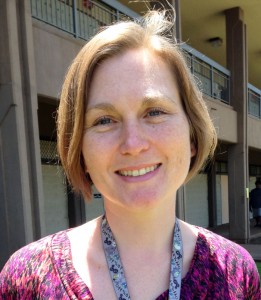
Apr 23, 2014 | Education, Stemworks

Sadie Mossman holds a perfect attendance record at the Hawaii Science Technology Engineering and Math (STEM) Conference presented by Maui Economic Development Board. “MEDB always brings in great resources at the conference and I come away every year learning something,” said Mossman, a 13-year teaching veteran from King Kekaulike High School.
For the fifth consecutive year, the STEM conference is expected to draw hundreds of students statewide to Maui to celebrate STEM learning projects and connect with others who share their interests in science and technology, math and engineering. Experts from innovative companies such as Google and National Geographic provide hands-on STEM lessons and help conference participants apply their STEM skills in competitions. Professional development workshops for teachers are also offered at the conference. A limited number of spots are still open for the first day of the conference – May 2nd from 8:30 a.m. to 4 p.m., at the Wailea Marriott Resort & Spa. Cost is $20 per teacher and includes lunch. The online registration link is: http://stemconference2014.eventbrite.com. Contact Lesley Bristol at bristol@medb.org or call 875-2332.
Mossman, who teaches biology and bio-technology to 10th-, 11th- and 12th-graders, said the annual conference has challenged her and her students to approach lessons in science, math and technology in ways they’ve never done. “For me in science, it’s helped me get comfortable with the Internet and the different resources and teaching tools available,” she said.
“It also helps to create a bridge between what my students want to do and what resources are available.” Mossman said she appreciates the opportunity to connect with experts in the science and technology field as well as teaching peers from around the state. “MEDB and the STEM conference really provide an opportunity for teachers to create connections and collaborate,” she said.
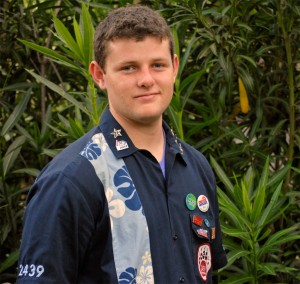
Apr 9, 2014 | Education, Stemworks

Baldwin High School robotics team captain Joey Albright has been accepted into six colleges with plans to pursue a degree in mechanical engineering. He says his experience with robot building and the task of writing grants to fund the robotics team helped him to succeed. “STEM education is important. It paid off for me,” said Albright, who has been on the Baldwin robotics team since his freshman year.
Albright took charge in his junior and senior year with applying for monetary support from the Maui Economic Development Board’s Ke Alahele Education Fund Program. “Getting money was number one for me. We can’t be competitive without funding,” Albright said. He said he gladly accepted the duties of grant writer because he wanted to improve his writing skills. “I thought it was a great opportunity to get experience and skills to apply for colleges and for scholarships,” he said. “I learned the importance of meeting deadlines, of dealing with different types of people and just working with a team. I think it was definitely worth it.” Albright said his fellow Baldwin Robotics Club members helped with writing for other private grants including Sean Endo and Aubrey Unemori.
Albright graduates in a few weeks, having competed on the state and national level. He said he would encourage new students to sign up for robotics. “The best thing for freshmen is to stick with it, no matter how much it takes,” Albright said. Since 2007, more than $740,000 in grants has been awarded to schools and students and their STEM education programs and projects. This year’s Ke Alahele Education Fund Dinner and Auction will be held Aug. 23 at the Grand Wailea Resort. Sponsorships opportunities are available. Contact MEDB at cari@medb.org; call 875-2300, or visit: www.medb.org/KeAlahele/overview.cfm
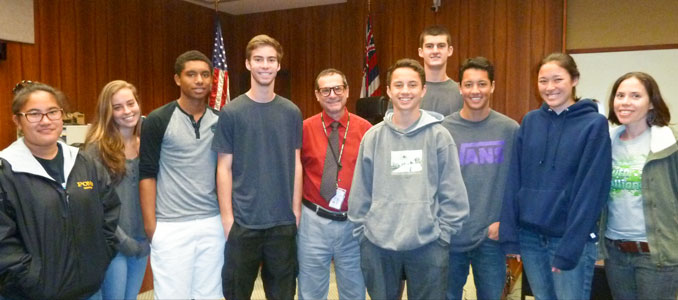
Apr 2, 2014 | Education, Stemworks
 For 16-year-old twins Jessie and Jordan Haylor, participating in a recent Maui Youth Alliance visit to 2nd Circuit Court in Wailuku was eye-opening. “It was such an incredible experience being able to converse with Judge Peter Cahill,” Jessie said. “I was unaware of the occupation of child advocacy, which truly interests me. I also learned about the Hawaii legal system, which is important for upcoming laws such as the new information regarding medical marijuana.”
For 16-year-old twins Jessie and Jordan Haylor, participating in a recent Maui Youth Alliance visit to 2nd Circuit Court in Wailuku was eye-opening. “It was such an incredible experience being able to converse with Judge Peter Cahill,” Jessie said. “I was unaware of the occupation of child advocacy, which truly interests me. I also learned about the Hawaii legal system, which is important for upcoming laws such as the new information regarding medical marijuana.”
Jordan said he saw the state’s criminal justice system at work. “I learned from this visit how criminals are prosecuted,” he said. The students in the Youth Alliance – a Maui Economic Development Board project to empower high school aged leaders – spent one morning observing 2nd Circuit Judge Peter Cahill preside over a variety of cases. His morning court calendar included granting an early dismissal of a man’s five-year probation; allowing a drug felon to take prescribed medicinal marijuana to treat a physical ailment; and a change of plea from a couple who chose not to contest welfare fraud charges. “I visited the courts once before for a law class I was in and this time we saw a lot more interesting cases, and I learned more because of the diversity,” Jordan said.
After the proceedings, Cahill, a lawyer with three decades of experience and now two years on the bench, met with the Youth Alliance members. “One is not better than the other. They’re different,” Cahill responded to Jordan’s question about whether he had a preference between serving as a lawyer or a judge. Jessie said she came to appreciate the criminal justice system. “I believe we are quite blessed to have such a justified legal system,” she said. With Cahill’s help, Jordan said the youths were able to compare the American justice system with those in other countries. Jessie said the visit to the Wailuku courthouse was her first Youth Alliance event, and she’s eager to participate more in the future. Jordan agreed. “Youth Alliance has helped open my eyes to how we can better our community and become more independent,” he said.
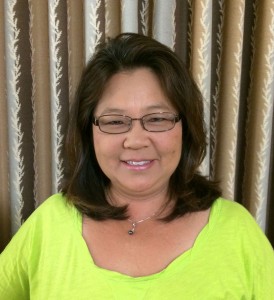
Mar 26, 2014 | Education

Students in kindergarten through 5th grade at Pukalani Elementary School are enjoying, even getting excited about, science these days, according to Curriculum Coordinator Jasmine Domingo. So much so, that more than 100 of them have been engaging in extracurricular, school-sponsored science camps, in part because of financial assistance from the Maui Economic Development Board Ke Alahele Education Fund. Last fall, MEDB awarded a $4,945 grant to Domingo and her school to purchase “Engineering is Elementary” curriculum and kits for the 500-plus pupils at the Upcountry school.
The purpose behind the new science curriculum and kits is to expose students to the many fields of science and increase their interest in the subject. “Oh yes, the kids are very excited about science,” Domingo said about the impact of the Ke Alahele grant at her school. “They say things like ‘This is so much fun’ and ‘I can’t wait to do science.’“ The mission of “Engineering is Elementary” curriculum and kits is to foster engineering and technological literacy among all elementary-aged students. Each unit is introduced by a storybook about a child who solves a problem through engineering and science. The material and exercises in the kits are all research-based and classroom-tested.
Domingo, a teacher with 22 years of experience and seven as a curriculum coordinator, said her school hopes to build confidence and provide encouragement to teachers to use science as a means to teach students about the world around them. “Science can be time-consuming, especially for elementary teachers who have to teach different subjects,” Domingo said. “Anytime you can make it easier for teachers to teach science, it’s a good thing.” Already one teacher has initiated her own science-based lesson plan. “I feel excited because I see that both teachers and students are seeing the effects of science in their everyday lives. Everyone’s learning.”
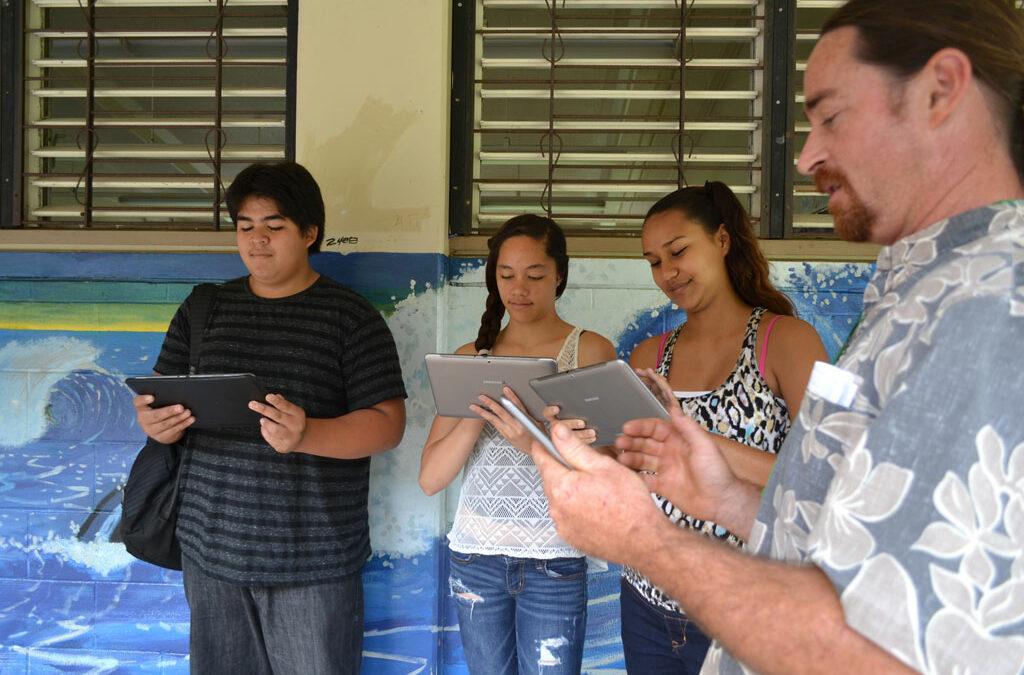
Feb 26, 2014 | Education
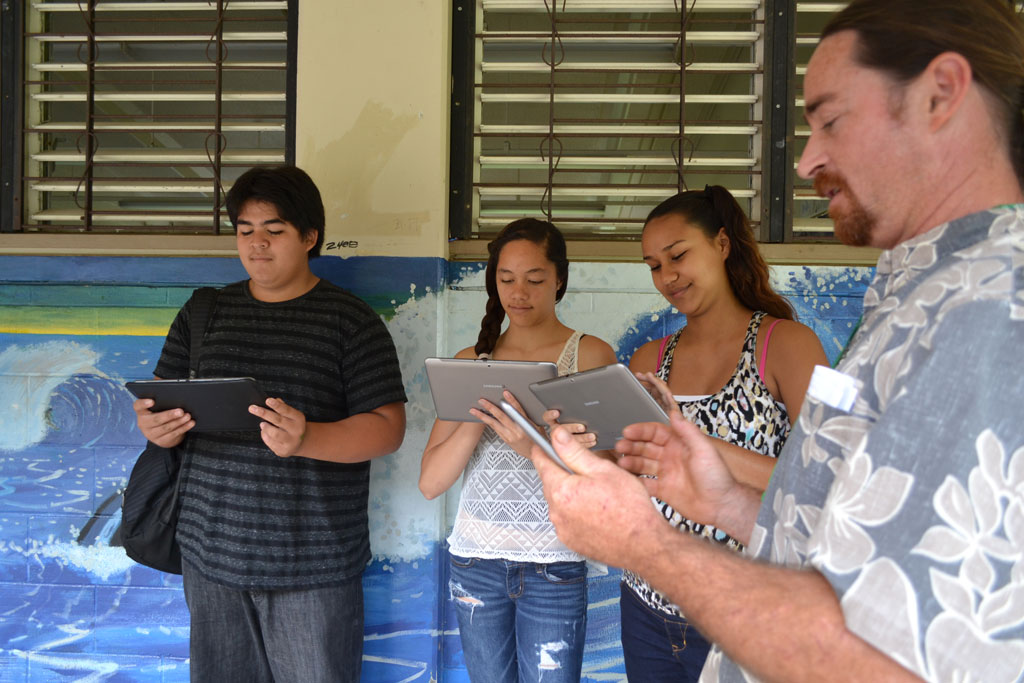 Hana High School science and natural resources teacher Paulo Burns says he and many of his students are visual learners, meaning that seeing is believing for them. So, when Burns and his students received 10 computer tablets, a projector, a laptop and a camera with a $5,000 Ke Alahele Education Fund grant, they were able to see what otherwise would be academic abstractions. “Science deals with teaching so many new vocabulary words and concepts that it is like teaching a foreign language,” he said. “If we don’t give our youth every tool at their fingertips to help them understand it, then many will give up easily and not pursue careers in science.”
Hana High School science and natural resources teacher Paulo Burns says he and many of his students are visual learners, meaning that seeing is believing for them. So, when Burns and his students received 10 computer tablets, a projector, a laptop and a camera with a $5,000 Ke Alahele Education Fund grant, they were able to see what otherwise would be academic abstractions. “Science deals with teaching so many new vocabulary words and concepts that it is like teaching a foreign language,” he said. “If we don’t give our youth every tool at their fingertips to help them understand it, then many will give up easily and not pursue careers in science.”
Burns’ students used the new tablets to study the voyages of crews aboard Hawaiian canoes as they navigated across vast expanses of the Pacific Ocean. “We wanted to provide students with tools of the 21st century to help them succeed in school,” he said. “We wanted to connect with Hawaiian culture through studying the canoe voyages and using modern computer tablets to blog questions to them. We wanted to make a Hawaiian compass at school to show the students that they will never be lost with the education they got at Hana School.” Burns said the tablets were successful in reaching his goals.
Burns said he believes it’s important for the community to support schools in the education of science, technology, engineering and math. “STEM is all around us in the real world, so it is critical that communities support it so that the next generation has the foundation to help solve the problems that we all face today,” Burns said. “We need to create problem-solvers that know how to use modern tools to come up with solutions.” Burns said he appreciates the Maui Economic Development Board and its Ke Alahele Education program. “MEDB was thoughtful to invest in the lives of our youth to help them succeed and create a better future.” The Ke Alahele Education Fund was established to support the growing need for students to gain proficiency in Science, Technology, Engineering and Math (STEM) in Maui County.

 A Ke Alahele Education Fund grant for Montessori School of Maui was intended to support its engineering and robotics programs plus help provide a practical learning environment for students to enhance their skills in science, technology, engineering and math or STEM. But it went beyond that, according to Thomas Daubert, the school’s director of development. “In its first year, our after-school Robotics and Engineering studios have provided a fun learning environment for up to 16 students each session,” he said. “The students came away with increased skill development and a new way to perceive themselves and the physical world around them,” Daubert said.
A Ke Alahele Education Fund grant for Montessori School of Maui was intended to support its engineering and robotics programs plus help provide a practical learning environment for students to enhance their skills in science, technology, engineering and math or STEM. But it went beyond that, according to Thomas Daubert, the school’s director of development. “In its first year, our after-school Robotics and Engineering studios have provided a fun learning environment for up to 16 students each session,” he said. “The students came away with increased skill development and a new way to perceive themselves and the physical world around them,” Daubert said.







 Hana High School science and natural resources teacher Paulo Burns says he and many of his students are visual learners, meaning that seeing is believing for them. So, when Burns and his students received 10 computer tablets, a projector, a laptop and a camera with a $5,000
Hana High School science and natural resources teacher Paulo Burns says he and many of his students are visual learners, meaning that seeing is believing for them. So, when Burns and his students received 10 computer tablets, a projector, a laptop and a camera with a $5,000 